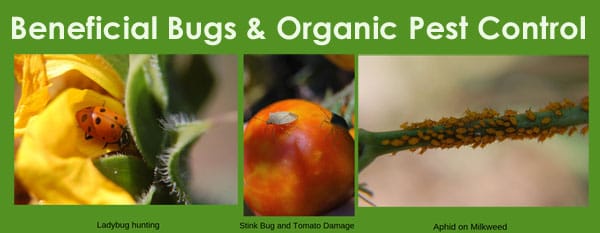Newsletter Articles
Beneficial Bugs & Organic Pest Control
By David S.
The quest for organic and bee-friendly gardens begins with understanding the natural way in which nature takes care of garden pests. At Green Thumb Nursery we stock organic pest controls including biologic controls (live insects) and organic chemical solutions that focus on natural pest relationships, such as the aphid and the ladybug. Here’s a closer look at what this means and some tips on how to organically handle pest control around your yard.
Specific Pest Solutions
In the insect world, there are generalists and pest-specific predators. Ladybugs and praying mantis are both generalist – They will eat whatever they can find and subdue. On the other side of this are insect predators that prey upon only a specific insect. Most home gardens benefit from generalist because they help to address a broader range of pest problems. A ladybug, for example, will prey on aphids, scale insects, potentially leaf miners, whiteflies, dermestid beetles, thrips, and other pests. A mantis may prey on larger insects and even small snakes. A tomato hornworm, which is the size of an index finger, is a prime target for a mantis. Stink bugs and other Hemiptera are also prey for mantis.
Ladybugs are sold as a live pest control solution, as are mantis egg cases. These are both easy to use. For ladybugs, open the bag, and they will disperse. For the mantis egg casing, just place them in a sunny spot, and they will hatch a little later in the spring.
Honing in on Pests
When we talk about live insects for beneficial pest control, it is essential to understand the pest that you want to control. An excellent example of this is aphid infestations. A praying mantis, though voracious, is not going to do much to help control aphids. The aphids are just too tiny for the larger mantis. If you have a mantis hatching, the young might happily wipe out an aphid infestation, but that is a short window of opportunity. A better solution for aphids would be ladybugs or ladybirds — Ladybugs are not bugs at all, but Ladybird beetles and their size make them perfect for aphid-sized garden pests. Another remarkable feature of ladybugs is that in their larval form, they are just as voracious as they are in their adult form. This means that through two stages of their lifecycle they are destroying pests in your garden.
TIP: Add to your shopping cart three powerful generalists – Live Ladybugs, Mantis Casings, and Green Lacewings. All are easy to use and excellent live pest control partners.
The green lacewings cover many of the same pests as do ladybugs and this means you are gaining better coverage using both.
TIP: Consider the size of the pest as you consider the options for beneficial insects. In science, we call these biological controls, -a living answer to pest control.
Beyond Ladybugs and Mantis is an entire host of other insects that you can attract to your garden. Also, in terms of aphid populations, a specialist that is likely in your yard already is a species of Braconid wasp preys on aphids. These are solitary wasps and unlike the yellowjackets and hornets do not swarm. These are also parasitoids, and their larva eat the aphids. You cannot buy these in stores, but you can attract them to your yard with small flowering plants, such as herbs, dill, oregano, etc. Ask us for recommendations for your hardiness zones.
Spider Mite Control
A common garden pest is the dreaded spider mite, and you can counter these before their infestation begins by using predatory mites. There are many types of mites, and many do an excellent job keeping your garden free of smaller pests, such as spider mites. The trick is to deploy the predator before the pest population becomes too large.
On an even smaller level are beneficial nematodes – these are microscopic, and most are a variety of roundworm that prey on larva found in the soil. Many beetles burrow into the ground either to pupate or to live out the larval form of their lifecycle. Beneficial nematodes are an excellent way to control pest populations before they become noticeable. These are very much an ounce of prevention.
Plant Health and Pest Control
Healthy plants have their own defenses, and you can help plant health by building soil health with live additions such as red worms. Worms help break down soil nutrients into small and often usable forms for plants, and they keep soil loose so that organic material can absorb water. Plus they help to aerate the soil so that the beneficial bacteria in the soil can thrive. Every garden needs red worms.
Organic Pest Control Product
Sometimes a live solution is not a complete answer, and while it is always recommended having ladybugs, mantis, and green lacewings in the garden, it is also suggested having a few organic pest control products around too. Here are some of our top suggestions for organic pest control products.
Organocide – is a bee safe oil-based organic pesticide. This is one of our top recommendations as there are no harmful chemicals in this product. It is made from a blend of oils (not petroleum-based) that works to destroy pest-insect population throughout all phases of their lifecycles. This is a wonderful product for year-round gardens as it helps to destroy pests safely on food-based plants, including insect eggs, nymph/larva, pupa, and adults. Perfect for all soft-bodied insects such as aphids. It also works to stop powdery mildew and other fungi. Will not harm bees or other beneficial creatures.
Monterey Bt. — This is a must for anyone who grows fruit. Monterey Bt. as a liquid is sprayed onto fruit trees. The liquid is safe, organic and it uses a live agent — beneficial bacteria — to destroy caterpillars and only caterpillars. On fruit trees, many caterpillars of moths in larval form. Monterey Bt. destroys them safely. Butterfly and moth are in the order of lepidopteran, and their caterpillars do the most damage. The adults are pollinators, but in larval form, they can denude a healthy tree in no time. The beneficial bacteria in Monterey Bt. only affect caterpillars. This is a bee-safe and beneficial insect-safe product.
Neem Oil — this is a plant-based product that is derived from pressing the foliage and fruit of Azadirachta indica trees. The pungent smell of the oil is an excellent repellent and is effective on smaller pest insects such as aphids, whiteflies, leafminers, and larger insects such as caterpillars and Japanese beetles. This is another bee-friendly product and does not harm most insects. This product is an excellent fungicide and will help control fungal issues such as powdery mildew.
Captain Jacks Dead Bug Brew — Organic in nature, Captain Jack’s Dead Bug Brew comes in either a dust formulation or liquid. It is derived from a chemical produced by Spinosad bacteria and acts as a nerve toxin for insect pests. It is excellent for caterpillar control and will even stop infestations of thrips, boring beetles, and bagworms making this an excellent product for lawns and trees. The downside of this product is that it can also affect some beneficial insects.
Sluggo – Snails & Slugs is an organic compound designed to kill slugs and snails in the garden. This is a baiting program that only impacts slugs or snails. They consume the bait and return to their hiding spot where they die. The active ingredient is iron phosphate which degrades as the bait dissolves. It is safe to use, and because it is a bait, you can continue to harvest fruit and vegetables from the application area.
Alternatives to Organic Chemicals
One alternative that Green Thumb Nursery recommends is the sealed garden system — Vegepod with its protective netting. Vegepod is easy to use and makes it easy to garden because the unit is manufactured at a perfect height and features watering functions and water runoff reservoir. Vegepod is ideal for people with limited mobility.
Remember that organic pest control can be seasonal or annual and the live insects are very popular as such, plant and product availability changes daily for each of our five store locations throughout Southern California. If you are interested in a particular plant or product featured in our garden newsletter, it is always best to call ahead and check if it is available.
Do you like what you see? Sign up for our weekly newsletter to get content like this every week!

